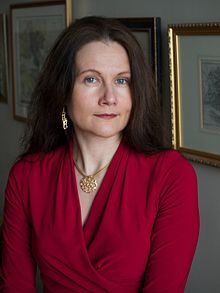Kai Aareleid
Kai Aareleid (born September 26, 1972 in Tartu ) is an Estonian writer and translator .
Life
Kai Aareleid graduated from high school in Tallinn in 1990 and then briefly studied psychology at the University of Tartu . But then she quickly went to Finland and took a degree in dramaturgy at the Helsinki Theater Academy , from which she graduated in 1997 with a master's degree. In the meantime she studied Spanish at the National Autonomous University of Mexico . She then specialized as a translator and editor at Tallinn University (2001). Since 2011 she has been working as an editor at Loomingu Raamatukogu ('Library of Looming'), a series of paperback books affiliated with the literary magazine Looming , in which mainly translations are published. Aareleid himself translates from English, Finnish, Portuguese and Spanish.
Kai Aareleid has been a member of the Estonian Writers' Union since 2012 .
Literary work
Aareleid's first novels appeared in Looming magazine from 2003 , and her book debut followed in 2011 with the autobiographical novel Russian Blood . Her great-grandmother was Russian and the author herself lived in Saint Petersburg for a few years . The novel was highly praised "as one of the most important books [of the previous year]" and was shortlisted for the coveted annual prize of the cultural capital , which rarely happens with debuts. The “emotional charge”, which is otherwise often lacking in contemporary Estonian literature, was particularly emphasized. It is also to be welcomed that, as in the work of Andrei Hvostov , for example , the “Russian element” in the identity of the Estonians is illuminated, because “Russian culture has probably influenced our identity as much, if not more, than German Baltic culture ”. Another reviewer felt reminded of comparable works by Jaak Jõerüüt or Viivi Luik , who also put the experiences of their stays abroad on paper in partly fictional and partly essayistic form.
Her second novel Life and Death (2016) met with a great response . It has received many positive reviews and Peeter Helme compared it with Viivi Luik's novel The Seventh Peace Spring (1985, German 1991). In the novel, a main character, born in 1946, goes in search of clues to her father, who died when she was sixteen years old. In "84 short novels in which there is not a single superfluous word", as the writer colleague Aarne Ruben put it, the post-war period in Estonia is described in poetically rich language using a family history.
Aareleil's poetry, with which she began later than prose, gave the impression, according to one critic, as if it came from an "aged poet", which was not meant negatively. Rather, the critic praised the "happy nostalgia" of the Japanese style, which contrasts with the sad nostalgia customary in the West.
Aareleid has translated numerous novels by Carlos Ruiz Zafón , as well as works by Paulo Coelho , Roberto Bolaño and Bruce Chatwin .
Awards
- 2013 Friedebert Tuglas Prize
- 2016 author of the year in Estonia
bibliography
- Vene veri ('Russian blood'). Tallinn: Varrak 2011. 200 pp.
- Naised teel ('women on the way' or 'women having tea'). Tallinn: Eesti Keele Sihtasutus 2015. 102 pp.
- Vihm ja vein ('rain and wine'). Tallinn: Eesti Keele Sihtasutus 2015. 63 pp.
- Linnade põletamine ('life and death' or 'cities burn'). Tallinn: Varrak 2016. 327 pp.
- Latvian translation: Pilsētu dedzināšana. Tlk. Maima Grīnberga. Rīga: Lauku Avīze 2017. 336 pp.
- English translation: Burning Cities. Transl. by Adam Cullen. London: Peter Owen Publishers 2018. 256 pp.
- Finnish translation: Korttitalo . Suomentanut Outi Hytönen. Helsinki: S&S: 2018. 333. p.
- Salaelud ('Secret Lives'). Tallinn: Varrak 2018. 149 pp.
literature
- Holger Kaints : Vene vere minevik ja tänapäev, in: Looming 3/2012, pp. 435–437.
- Ilona Martson: Vene veri ja häbi, in: Vikerkaar 6/2012, pp. 101-104.
- Mari Peegel: Nostalgia-tüdruk hüüumärgi tagant, in: Looming 12/2015, pp. 1791–1793.
- Peeter Helme: Memories and history - friends or enemies ?, in: Estonian Literary Magazine 43 (2016), pp. 24–29 [2]
Individual evidence
- ↑ Jan Kaus: Mina ja maailm, ajalugu ja aeg. Eesti algupärane proosa 2011, in: Looming 3/2012, p. 411.
- ↑ Ilona Martson: Vene veri ja häbi, in: Vikerkaar 6/2012, pp. 102, 104.
- ↑ Holger Kaints: Vene vere minevik ja tänapäev, in: Looming 3/2012, p. 435.
- ↑ in: Estonian Literary Magazine 43 (2016), p. 26 [1]
- ↑ Postimees June 18, 2016.
- ↑ Mari Peegel: Nostalgia-tüdruk hüüumärgi tagant, in: Looming 12/2015, p. 1792.
- ↑ The title is ambiguous and describes on the one hand the popular, simple card game, but on the other hand also the burning of cities, which refers to the destruction of the Second World War.
| personal data | |
|---|---|
| SURNAME | Aareleid, Kai |
| BRIEF DESCRIPTION | Estonian writer and translator |
| DATE OF BIRTH | September 26, 1972 |
| PLACE OF BIRTH | Tartu |
